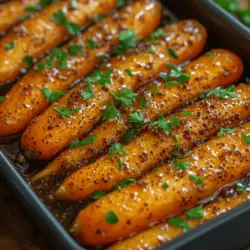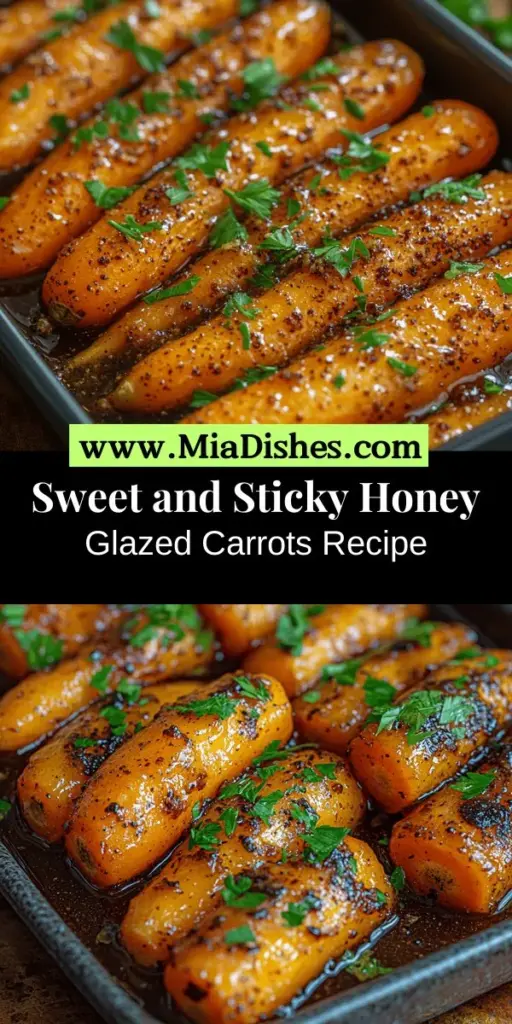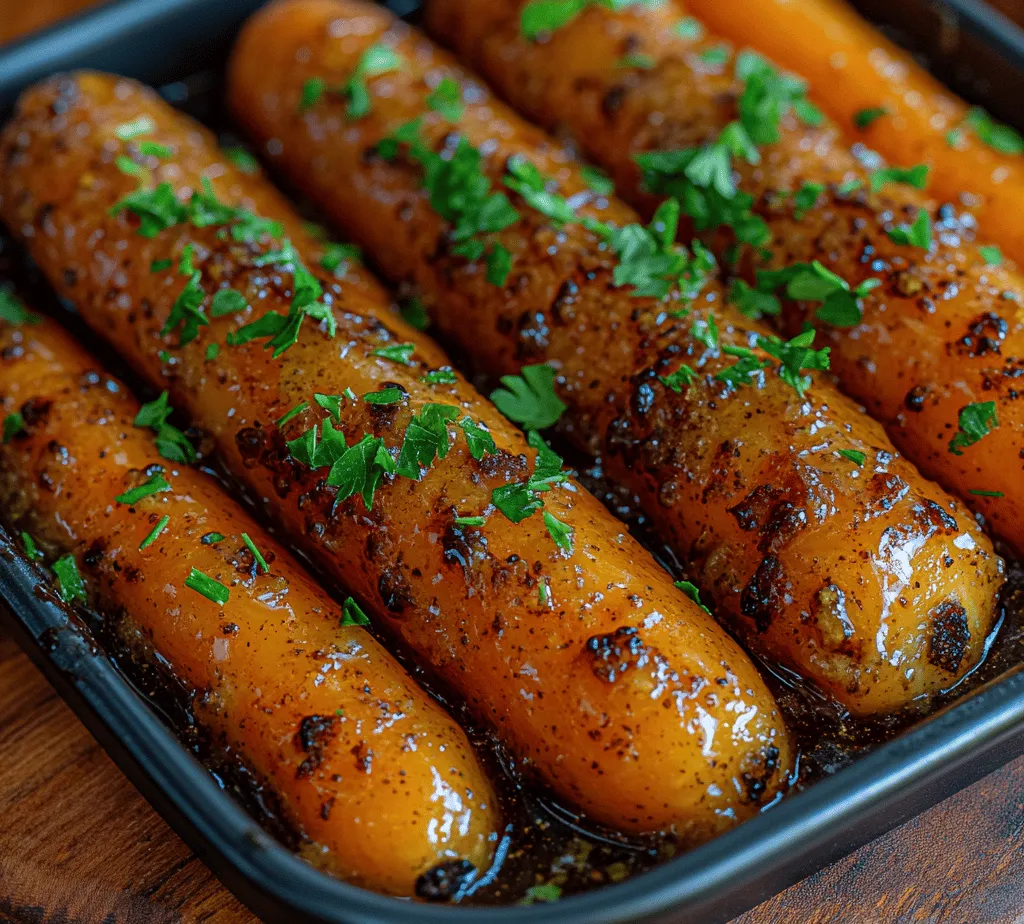Introduction
Sweet and sticky honey glazed carrots are a delightful addition to any meal, bringing a burst of flavor and color to your plate. Their natural sweetness, enhanced by a rich honey glaze, makes them a favorite among both children and adults. These carrots not only serve as a delicious side dish but also present an excellent opportunity to incorporate more vegetables into your diet. The balance of sweet and savory in this recipe elevates the humble carrot to a new level, making it a versatile accompaniment to a variety of main dishes.
Incorporating vegetables into our meals is essential for maintaining a balanced diet. They provide vital nutrients, add flavor, and contribute to overall health. Carrots, in particular, are a powerhouse of goodness, offering a range of health benefits that make them a smart choice for any meal. With their vibrant color and natural sweetness, honey glazed carrots are not just visually appealing; they are also a nutritious option that can enhance the enjoyment of dining.
The Nutritional Value of Carrots
Carrots are more than just a crunchy, sweet vegetable; they are a nutritional treasure trove. Rich in vitamins, minerals, and antioxidants, carrots are an excellent addition to any diet. A single serving of carrots provides a healthy dose of vitamin A, which is crucial for maintaining good vision, supporting immune function, and promoting skin health. Furthermore, carrots are a good source of vitamin K, potassium, and dietary fiber, all of which contribute to overall wellness.
The health benefits of carrots extend beyond their impressive vitamin content. They are low in calories, making them an ideal choice for those looking to maintain or lose weight. The fiber in carrots aids digestion and helps keep you feeling full, reducing the temptation to snack on less healthy options. Additionally, the antioxidants found in carrots, such as beta-carotene, play a significant role in reducing inflammation and protecting the body from free radicals.
Incorporating carrots into your meals is simple and versatile. Whether you enjoy them raw, roasted, or glazed, they can easily fit into a balanced diet. The sweet and sticky honey glazed carrots recipe not only showcases the natural flavor of this vegetable but also turns it into a dish that everyone can enjoy.
Ingredients Breakdown
To create the perfect sweet and sticky honey glazed carrots, you will need a handful of simple yet flavorful ingredients. Each component plays a distinct role in achieving the ideal taste and texture, making it essential to understand their contributions.
Carrots: Baby Carrots vs. Regular Carrots
The star of this dish, of course, is the carrot itself. When it comes to choosing the right carrots, you have the option of baby carrots or regular carrots. Baby carrots are convenient, pre-washed, and cut into bite-sized pieces, making them quick and easy to prepare. They are typically sweeter and have a softer texture, which is appealing to many. However, regular carrots offer a more robust flavor and a firmer texture, which can add a satisfying crunch to the dish.
When selecting fresh carrots, look for ones that are firm, smooth, and brightly colored. Avoid any that appear limp or have dark spots, as these may indicate age or spoilage. For the most flavorful results, opt for locally sourced or organic carrots whenever possible.
Butter: The Richness Factor
Butter is another key ingredient in this recipe, adding a layer of richness and depth that enhances the overall flavor of the dish. When melted and combined with the carrots, butter helps to create a silky texture in the glaze. For those looking to make the dish dairy-free, alternatives such as olive oil or vegan butter can also work well, though they may alter the flavor slightly.
Honey: A Natural Sweetener
Honey serves as the primary sweetener in this recipe, offering a unique flavor profile that complements the natural sweetness of the carrots. It not only enhances the taste but also contributes to the glaze’s sticky texture. Honey is a natural sweetener with health benefits, including antibacterial properties, antioxidants, and a lower glycemic index than refined sugars. This makes it a preferable choice for those seeking a healthier alternative to processed sugars.
Brown Sugar: Depth and Caramelization
In addition to honey, brown sugar is used to add depth to the glaze. Its molasses content lends a rich flavor that pairs beautifully with the sweetness of honey. The combination of honey and brown sugar creates a caramelization effect when cooked, resulting in a glossy and mouthwatering finish on the carrots.
Seasoning: Salt, Pepper, and Optional Cinnamon
Seasoning is crucial to balance the sweetness of the glaze. A pinch of salt enhances the natural flavors of the carrots, while black pepper adds a subtle kick. For those looking to experiment with flavors, a dash of cinnamon can be added to give a warm and comforting touch to the dish, making it perfect for cozy family dinners.
Fresh Lemon Juice: Acidity and Brightness
To brighten the flavor of the glaze, fresh lemon juice is essential. The acidity cuts through the sweetness, creating a harmonious balance that elevates the dish. It also adds a refreshing note that complements the carrots beautifully. Always opt for fresh lemon juice for the best flavor—bottled versions can lack the vibrancy needed for this recipe.
Garnishing with Parsley
Finally, fresh parsley is used as a garnish, adding a pop of color and a hint of freshness to the finished dish. Not only does it enhance the presentation, but it also provides a mild herbal flavor that complements the sweetness of the carrots. When selecting parsley, look for bright green leaves that are free from wilting or browning.
Step-by-Step Preparation Guide
Now that we have explored the ingredients, let’s dive into the step-by-step preparation guide for creating your sweet and sticky honey glazed carrots. Following these instructions will ensure that your carrots are perfectly cooked and beautifully glazed.
Preparing the Carrots
The first step in preparing your sweet and sticky honey glazed carrots is to wash and peel your carrots if you are using regular ones. If you opt for baby carrots, you can skip this step as they are typically pre-washed and ready to use. For regular carrots, peeling them will help achieve a smooth texture and allow the glaze to adhere better.
When cutting your carrots, it’s important to ensure uniformity in size. This will promote even cooking, allowing all pieces to become tender at the same time. Aim for carrot pieces that are approximately 1 to 1.5 inches long, which will provide the ideal bite-sized portions for your dish.
Tips for Selecting Fresh Carrots
As mentioned earlier, selecting fresh carrots is key to achieving the best flavor and texture. Look for carrots that are firm and vibrant in color. Avoid those with signs of wilting or blemishes. Additionally, consider the thickness of the carrots; thinner carrots tend to cook faster, while thicker ones may require a bit more time.
Boiling the Carrots
After preparing your carrots, it’s time to cook them. Start by bringing a pot of salted water to a rolling boil. Once boiling, carefully add the carrot pieces to the pot. The method of blanching is often used in this recipe, which involves briefly cooking the carrots in boiling water before finishing them in the glaze.
Blanching not only helps to enhance the color of the carrots, making them more visually appealing, but it also preserves their nutrients and texture. As the carrots cook, keep a close eye on the timing. You’ll want to boil them for about 4-5 minutes until they are just tender but still slightly firm. This will ensure they don’t become mushy when finished in the glaze.
Cooking Time Considerations for Desired Tenderness
Cooking times can vary based on the size and freshness of your carrots, so it’s a good idea to taste a piece after the initial cooking time. If they need a little more time, continue boiling for an additional minute or two, checking frequently. The goal is to achieve a perfect tenderness that allows for a pleasant bite without being overcooked.
Making the Glaze
With your carrots blanched and drained, it’s time to prepare the glaze. In a large skillet over medium heat, melt the butter. Once the butter is fully melted and bubbling, add the honey and brown sugar. Stir the mixture to combine, allowing the sugar to dissolve and the honey to blend seamlessly with the butter.
As the glaze begins to bubble gently, add in the blanched carrots, stirring to coat them evenly in the sweet mixture. Continue to cook the carrots in the glaze for about 5-7 minutes, stirring occasionally. During this time, the glaze will thicken and become sticky, enveloping each carrot in a luscious coating.
In the next part of this article, we will explore additional cooking techniques, tips for achieving the best results, and answer some common questions about sweet and sticky honey glazed carrots. For now, enjoy the process of creating this delightful dish that will surely become a favorite at your dining table.
The science behind emulsifying butter and honey is essential for creating the perfect glaze for your carrots. When you heat butter and honey together, the fat in the butter helps to create a smooth emulsion with the sugars in the honey. This process allows the glaze to adhere beautifully to the carrots, enhancing their flavor and texture. The key to achieving this smooth blend is to gently warm the butter until it melts and then incorporate the honey gradually. This helps prevent the mixture from separating.
Tips for Achieving the Perfect Glaze Consistency
To attain that ideal glaze consistency, you need to ensure that your mixture is neither too runny nor too thick. Here are some tips to help you achieve the perfect glaze:
1. Temperature Control: Keep the heat low to medium when melting the butter. High heat can cause the butter to brown too quickly, affecting the flavor of your glaze.
2. Proportions Matter: A good starting ratio is two parts honey to one part butter. Adjust this ratio based on your personal sweetness preference, but ensure that the honey is always the dominant flavor.
3. Simmering: Once combined, allow the mixture to simmer gently for a few minutes. This will help reduce the glaze slightly, concentrating the flavors and achieving a thicker consistency.
Glazing the Carrots
Once your glaze is ready, it’s time to bring your carrots into the spotlight. The process of glazing the carrots is straightforward yet requires some attention to detail:
1. Preparation: Begin by washing and peeling your carrots. If they are large, consider cutting them into even-sized pieces—this ensures uniform cooking and glazing.
2. Boiling: Place the carrots in a pot of salted boiling water. Cook them for about 5-7 minutes until they are tender but still crisp. This step is crucial—overcooked carrots will lose their vibrant color and crunch.
3. Draining: Once cooked, drain the carrots thoroughly. Excess water can dilute your glaze, so make sure to remove as much moisture as possible.
4. Coating: In a large skillet, combine the drained carrots with your prepared honey-butter glaze. Toss the carrots gently to coat them evenly.
Importance of Gentle Tossing for Even Coating
Gentle tossing is critical for ensuring that each carrot is evenly coated with the glaze. Tossing too vigorously can break the carrots or cause them to lose their shape. Use a spatula or tongs to lift and turn the carrots in the pan. This method allows the glaze to envelop each piece while maintaining their integrity.
How to Determine When the Glaze is Perfectly Thickened
The perfect glaze should cling to the carrots without pooling at the bottom of the pan. Here’s how to know when it’s just right:
1. Visual Check: As the carrots are coated, you’ll notice the glaze becomes glossy and starts to cling more.
2. Time: Allow the carrots to cook in the glaze for about 3-5 minutes. This will give the sugars time to caramelize and thicken without burning.
3. Taste Test: If you’re unsure, do a quick taste test. The glaze should be sweet and buttery, with the flavors of honey and butter harmoniously balanced.
Finishing Touches
The final touches can elevate your honey glazed carrots from good to extraordinary:
1. Lemon Juice: Adding a splash of fresh lemon juice just before serving brightens the flavor of the glaze and provides a delightful balance to the sweetness. The acidity from the lemon cuts through the richness of the butter and honey, making each bite refreshing.
2. Garnishing for Visual Appeal: Consider garnishing your dish with freshly chopped herbs, such as parsley or thyme. Not only do they add a pop of color, but they also contribute an aromatic freshness that complements the carrots beautifully.
Serving Suggestions
Honey glazed carrots are versatile and can complement a wide array of dishes. Here are some ideal pairings:
– Main Dishes: These carrots pair wonderfully with roasted chicken, grilled fish, or a hearty pork tenderloin. The sweetness of the glaze enhances savory flavors, making them a perfect side dish for many proteins.
– Cuisines: They can be served alongside various cuisines, from classic American to Mediterranean and even Asian-inspired dishes. Their sweet profile can balance spicier elements, making them a great addition to curry or stir-fry.
– Creative Presentation Ideas: For gatherings or special occasions, consider serving the carrots in a large, colorful bowl with a sprinkle of sesame seeds or chopped nuts on top for added texture. You could also serve them in individual ramekins for an elegant touch.
Storage and Reheating Tips
If you find yourself with leftovers, here’s how to store and reheat your honey glazed carrots effectively:
1. Best Practices for Storing: Allow the carrots to cool completely before transferring them to an airtight container. They can be stored in the refrigerator for up to three days.
2. Reheating: To reheat without losing texture or flavor, place the leftover carrots in a skillet over low heat. Add a splash of water or a bit more butter to help steam them and revive the glaze without drying them out.
3. Using Leftovers: Leftover honey glazed carrots can be a delightful addition to salads or grain bowls. Slice them up and toss them in with fresh greens, quinoa, or rice for a nutritious meal.
Variations on Honey Glazed Carrots
Exploring different flavor profiles can add a new dimension to your honey glazed carrots. Here are some variations you might enjoy:
1. Herbs: Fresh herbs like thyme or rosemary can be added to the glaze or sprinkled on top for an aromatic twist. These herbs complement the carrots’ natural sweetness beautifully.
2. Spices: Experimenting with spices like nutmeg or ginger can add a warm, cozy element to your dish. Just a pinch can transform the flavor profile into something unique and inviting.
3. Alternative Sweeteners: If you’re looking for a different sweetening option, consider using maple syrup or agave nectar. These alternatives work well in the glaze and cater to various dietary preferences.
4. Nuts and Seeds: For added crunch and nutrition, consider incorporating toasted nuts or seeds, such as walnuts or pumpkin seeds. They not only enhance the texture but also bring additional flavors to the dish.
Conclusion
The appeal of honey glazed carrots lies in their delightful balance of sweetness and richness, making them a versatile side dish that can complement a wide range of meals. Their simplicity allows for creativity, whether you stick to the classic recipe or experiment with various flavor profiles.
We encourage you to try this honey glazed carrots recipe and make it a staple in your home. Enjoying vegetables in delicious ways is key to a balanced diet, and this dish offers a perfect opportunity to do just that. The next time you’re looking for a side that impresses both visually and in flavor, turn to these sweet and sticky honey glazed carrots—it’s a dish that’s sure to become a family favorite!



